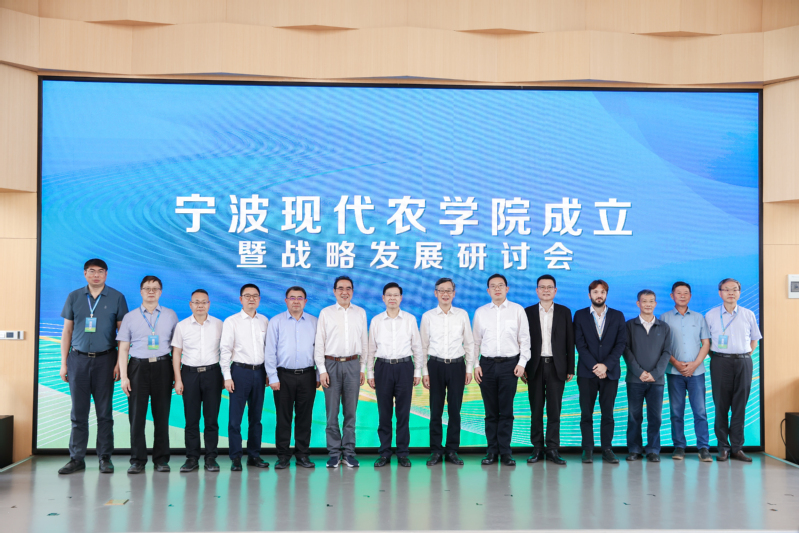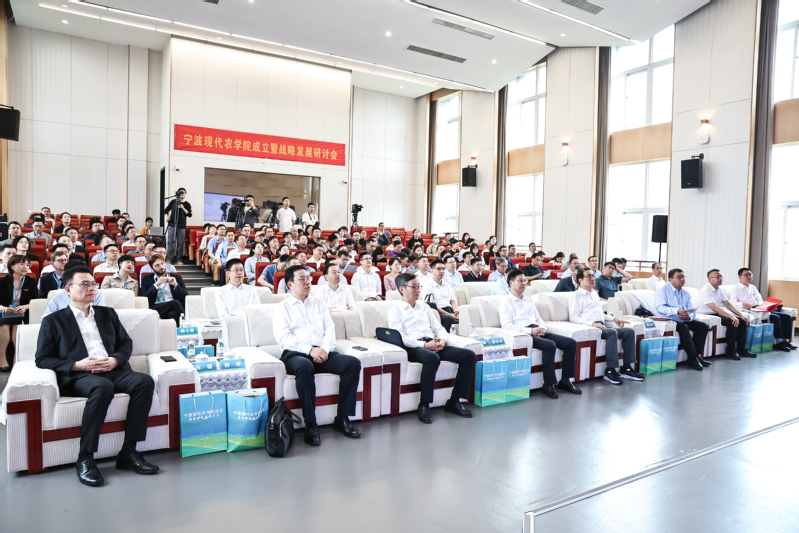
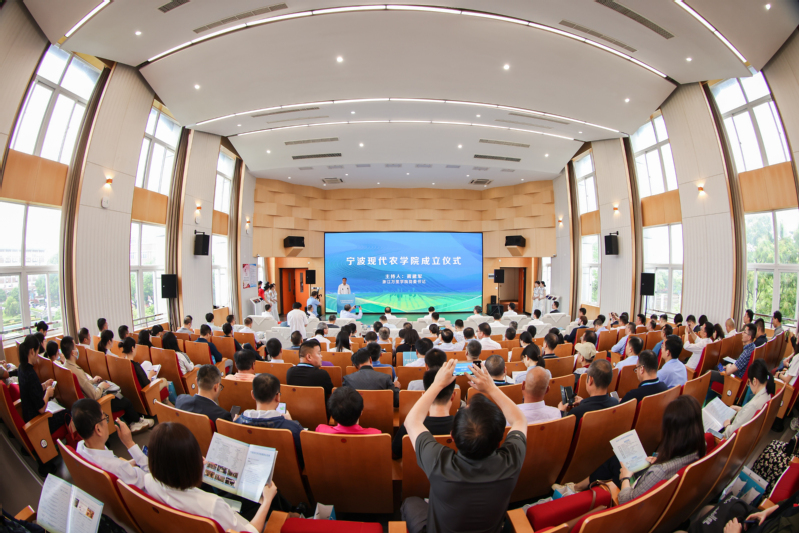
On the morning of June 11, the Inauguration Ceremony and the Strategic Development Seminar for the Ningbo Modern Agricultural College were held at the Huilong Campus of our university. Attendees included Zhong Guanhua, Deputy Secretary of the Ningbo Municipal Party Committee and Secretary of the Municipal Education Working Committee; Sun Jun, Deputy Secretary-General of the Municipal Party Committee and Director of the Municipal Supervision and Assessment Office; Mao Caisheng, Deputy Secretary of the Municipal Education Working Committee, Party Secretary, and Director of the Ningbo Education Bureau; Li Bin, Party Secretary and Director of the Ningbo Agriculture and Rural Affairs Bureau; Jiang Shiyong, Deputy Secretary of the Yinzhou District Party Committee; and leaders from the Municipal Organization Department (Talent Office), Science and Technology Bureau, Finance Bureau, Human Resources and Social Security Bureau, Natural Resources and Planning Bureau, and relevant departments from Yinzhou District.
Distinguished guests at the event included Professor Chen Jianping from Ningbo University, who is an Academician of the Chinese Academy of Engineering; Professor Paul Gladston, Vice Chancellor of the University of Nottingham Ningbo China; and Lü Lijiang, Party Secretary of the College of Agriculture and Biotechnology at Zhejiang University. Other special invitees were Professor Dong Weichun, Vice President of Nanjing Agricultural University; Professor Ai Qinghui, Dean of the College of Fisheries at Ocean University of China; Researcher Yang Hua, Executive Deputy Director of Xianghu Laboratory; Researcher Wang Yuhong, Director of the Ningbo Academy of Agricultural Sciences; and Mr. Bo Yongming, Chairman of Ningbo Weimeng Seed Industry Co., Ltd., representing the college’s co-founders.
Also in attendance were Wang Jianhou, Member of the Standing Committee of the Zhejiang Provincial People’s Congress and former Director and Party Secretary of the Zhejiang Provincial Civil Affairs Department, an alumnus of Zhejiang Agricultural University Ningbo Branch (Class of 1978, Agricultural Machinery); Liang Xiongjun, former Deputy Secretary-General of the Taizhou CPPCC and alumnus (Class of 1978, Agricultural Machinery); Researcher Ma Rongrong from the Ningbo Academy of Agricultural Sciences (Class of 1978, Agronomy); Professor Yang Yonghua from Nanjing University (Class of 1979, Agronomy); Professor Xu Mingliang from China Agricultural University (Class of 1980, Agronomy); Researcher Dai Jie, Deputy Director of Xianghu Laboratory (Class of 1987, Agriculture and Biology); and Guo Sitong, Deputy General Manager of Ningbo Yinzhou Sanfeng Kewei Foods Co., Ltd. (Class of 2002, Biotechnology).
Representatives from 15 companies, including Ningbo Seed Industry Co., Ltd., Ningbo Haitong Times Agriculture Co., Ltd., and Ningbo Yongsheng Aquatic Seed Industry Co., Ltd., also participated in the event.
Ying Xiong, Party Secretary and Chairman of Zhejiang Wanli Education Group, and Chairman of the Board of Zhejiang Wanli University, along with Lü Jie and Dai Juju, Vice Presidents of Zhejiang Wanli Education Group, attended the event. Also present were Lin Zhihua, President of ZWU; Jiang Jianjun, Party Secretary of ZWU; Ma Jianrong, Vice President of ZWU; Wang Weizhong, Deputy Party Secretary and Vice President of ZWU; and Vice Presidents Chen Jiange, Yang Zhenfeng, and Xu Liqing, as well as Assistants of Presidents Ge Chutian and Yu Dan. Together, they witnessed the official establishment of the Ningbo Modern Agricultural College. The inauguration ceremony was presided over by Jiang Jianjun.
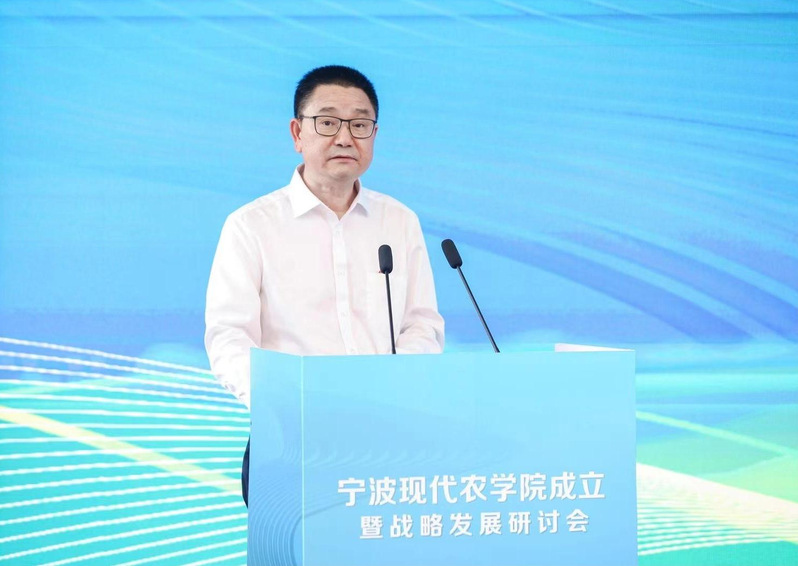
In his welcome address, Lin Zhihua highlighted that the establishment of the Ningbo Modern Agricultural College marks a milestone in the history of Zhejiang Wanli University. It carries the important mission and hope of advancing the development of the agricultural disciplines. The college’s creation is a significant step forward for the university in serving the region’s agricultural modernization and rural revitalization strategies. Lin emphasized that the university’s roots are in agriculture, and it has always been committed to strengthening and advancing the agricultural sector. Generations of agricultural science professionals have worked tirelessly, laying a solid foundation in agricultural disciplines, building innovative platforms for teaching and research, and enhancing the university’s research capabilities, which made the creation of Ningbo Modern Agricultural College possible. As a new era begins, the Ningbo Modern Agricultural College will focus on new demands for innovative development in areas such as new agriculture, new rural development, new farmers, and new ecosystems. The college will concentrate on fields like biological breeding, smart agriculture, and rural governance, advancing the construction of “new agricultural disciplines”. This will lay a solid foundation for Ningbo to advance high-quality development, promote common prosperity, and lead in the modernization of agriculture and rural areas in the province. The college also aims to contribute to the goal of building a strong agricultural nation.

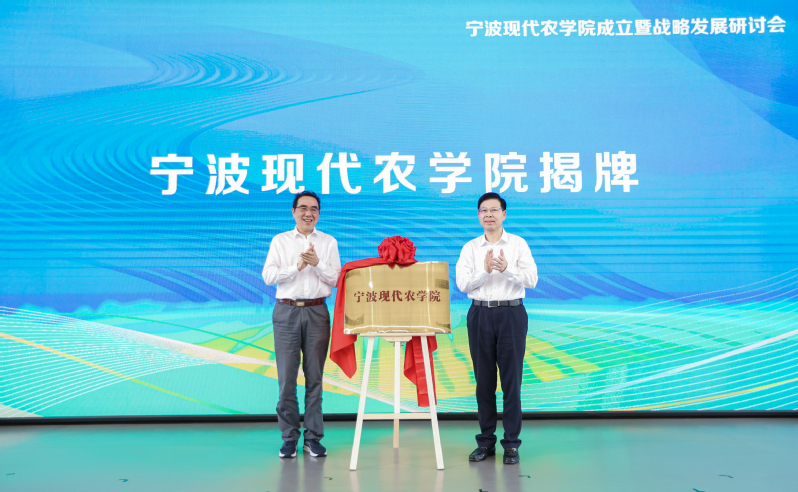
A collaborative effort between leading institutions and prominent enterprises, Zhejiang Wanli University signed agreements for joint development with five key partners: Ocean University of China, Nanjing Agricultural University, Xianghu Laboratory, Ningbo Academy of Agricultural Sciences, and Ningbo Weimeng Seed Industry Co., Ltd. During the ceremony, Zhong Guanhua and Chen Jianping jointly unveiled the plaque for the “Ningbo Modern Agricultural College”.
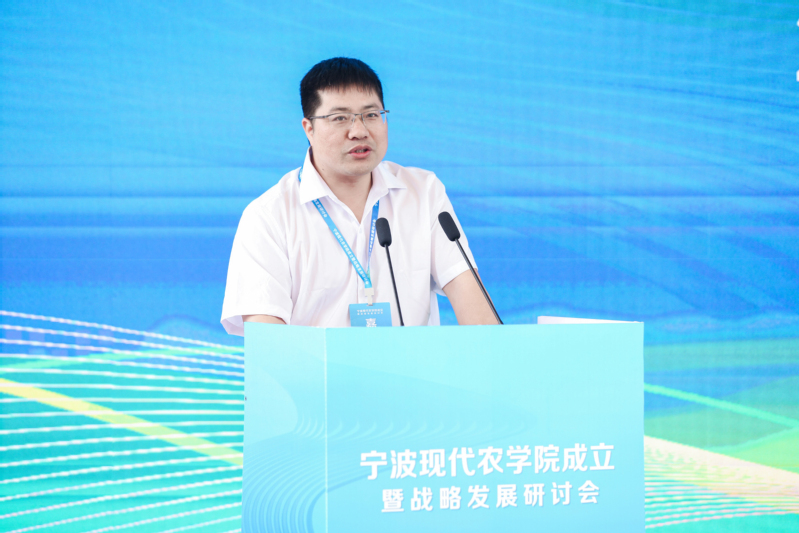
Our distinguished alumnus and young agricultural entrepreneur, Guo Sitong, shared his personal journey of “rooting in rural areas and serving agriculture” during his speech. He expressed a deep sense of familiarity and pride every time he returned to his alma mater. Reflecting on his post-graduation work in Ningbo’s agricultural development, Guo attributed his achievements to the careful nurturing he received from the university. He emphasized that the establishment of the Ningbo Modern Agricultural College marks a new chapter in agricultural innovation and talent development in Ningbo. Guo and his fellow agricultural entrepreneurs are eager to collaborate with the college and work together to contribute to building a strong agricultural nation.
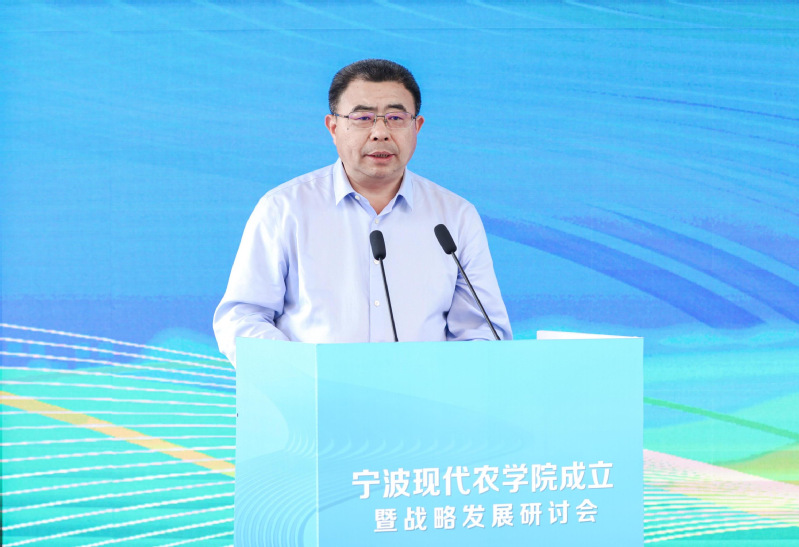
In his speech on behalf of the partnering institutions, Professor Dong Weichun emphasized that the establishment of the Ningbo Modern Agricultural College is a key initiative by Zhejiang Wanli University to advance the development of “new agricultural disciplines”. It represents a significant step in deepening higher education reform in Ningbo and aligns with the strategic goal of integrating higher education across the Yangtze River Delta. The joint creation of the college is not just a formal alliance but a substantive integration. Dong highlighted that Nanjing Agricultural University will adhere to the principles of being “goal-oriented, project-supported, fostering deep cooperation, and achieving mutual benefits”, and he added that the university will further strengthen collaboration in talent exchange, academic development, scientific research, the transformation of results, and decision-making consultation. Together, they aim to explore new models of collaborative development in higher agricultural education in the eastern developed regions and contribute more significantly to the modernization of agriculture and rural areas with Chinese characteristics.
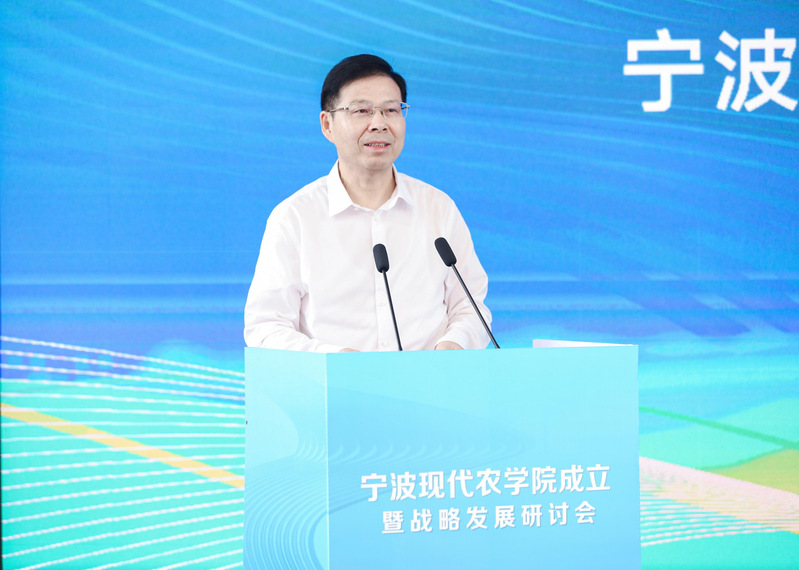
In his speech, Zhong Guanhua emphasized the significant importance of the establishment of the Ningbo Modern Agricultural College. He pointed out that China’s modernization is inseparable from the modernization of agriculture and rural areas, and the key to this lies in technology and talent. He stressed that the college, as a vital platform for cultivating new agricultural talent, must take on the mission of strengthening and advancing agriculture. The goal is for it to become a modern agricultural academy with distinctive regional characteristics, ranking among the top in China. Zhong called for the college to accelerate its development as a source of agricultural technological innovation, with a focus on key areas such as biological breeding, smart agriculture, and rural governance. He urged the college to optimize its academic programs, strengthen its faculty, enhance university-industry collaboration, and promote the application of research to continuously improve new agricultural productivity. He also emphasized the need to create a model for the integration of agriculture and education. By leveraging resources from top institutions and leading enterprises, the college should align itself with the forefront of agricultural development and integrate undergraduate, master's, and doctoral programs. Additionally, it should link field schools and practical training bases to establish a robust system where academic and industrial resources complement each other. Zhong further highlighted the importance of building a talent incubator, advocating for the integrated development of education, science, and talent. He called for the college to reshape systems for training high-quality farmers, modern agricultural vocational education, entrepreneurship incubation for new agricultural talents, and grassroots agricultural technology promotion. By implementing comprehensive “new agricultural talent” training programs, the college should nurture more urgently needed professionals for agriculture and rural development. Finally, Zhong expressed his hope for the Ningbo Modern Agricultural College, urging it to “remember its mission, uphold its fine traditions, and deliver outstanding results in empowering rural revitalization through talent cultivation”. He called on the college to provide more exemplary models for agricultural modernization and contribute significantly to Ningbo’s efforts to “strive for excellence, set a benchmark, and write a new chapter”.
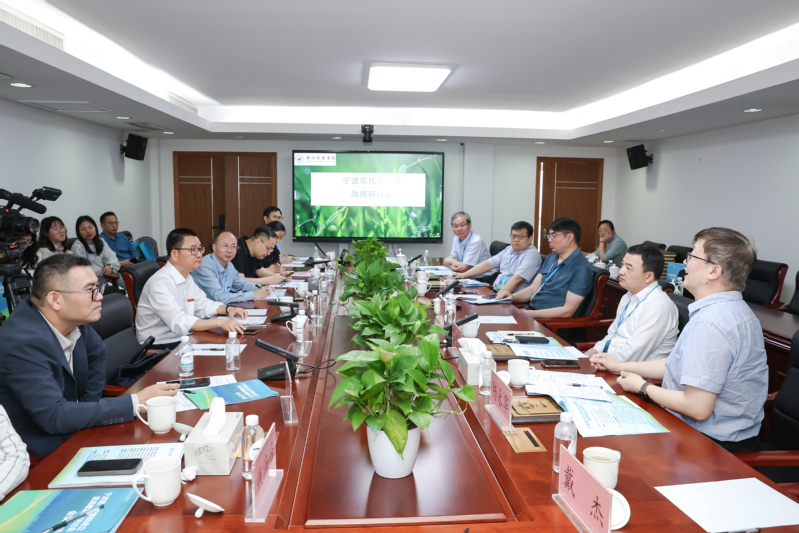
Following the inauguration ceremony, a strategic development seminar for the Ningbo Modern Agricultural College was held. Experts and scholars engaged in lively discussions on various topics, including the college’s educational positioning and goals, discipline and program structures, and construction tasks for the next five years. They provided valuable insights and constructive suggestions for the college’s development.
It was revealed that the Ningbo Modern Agricultural College is built on disciplines such as Agricultural Resources and Environment, Aquaculture, and Bioengineering, with plans to begin student admissions in 2025. Over the next five years, the college will accelerate the development of “new agricultural disciplines” and focus on cultivating urgently needed talent to serve the agricultural and rural sectors, aiming to train more than 1,000 undergraduate, master’s, and doctoral students.
Additionally, the college will prioritize tackling key core technologies to enhance the region’s modern agricultural productivity. It seeks breakthroughs in the establishment of provincial and national research and innovation platforms, the cultivation of high-level national talents, the development of national key projects, the creation of new agricultural varieties, and the commercialization of technological achievements.
